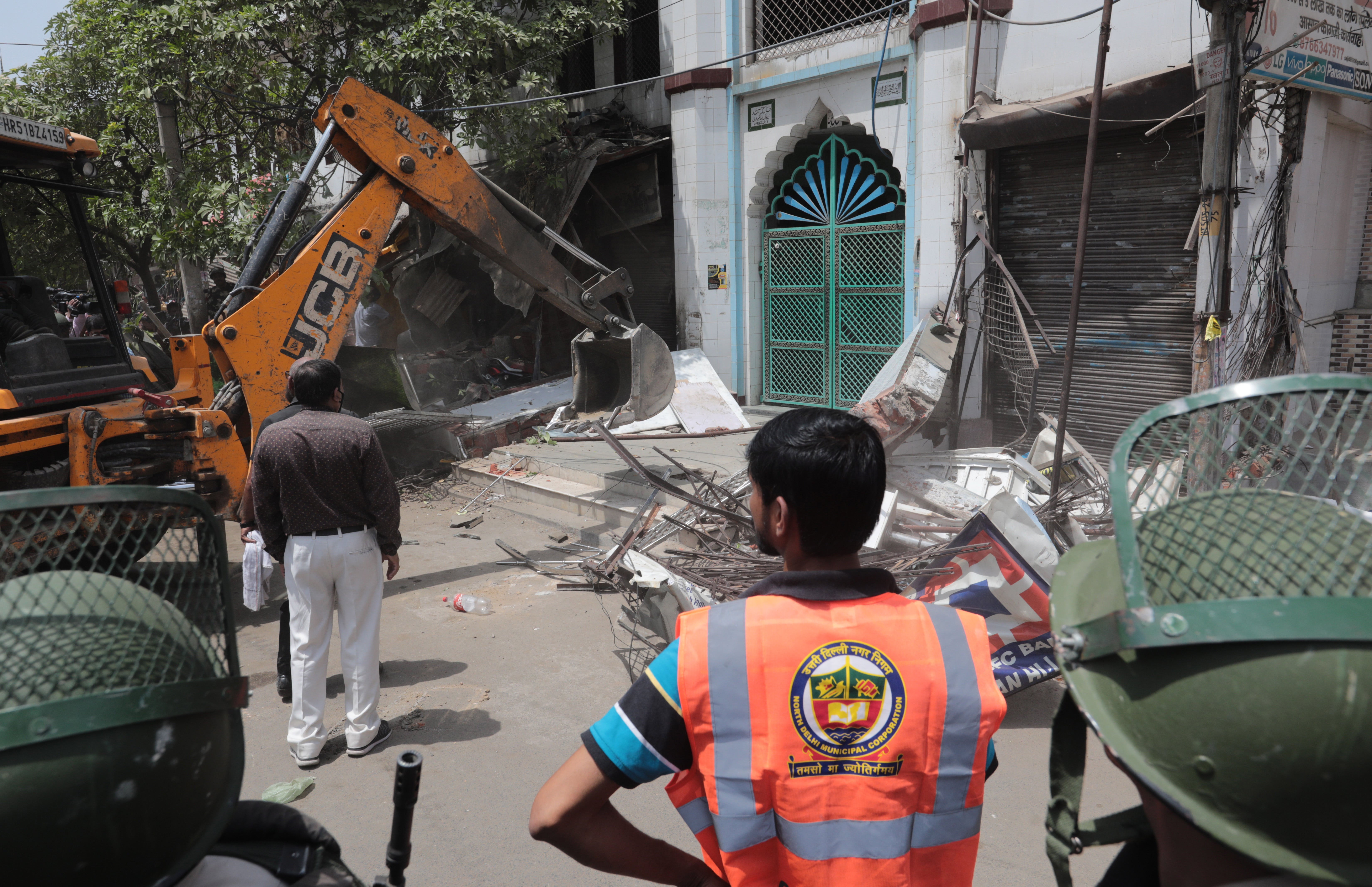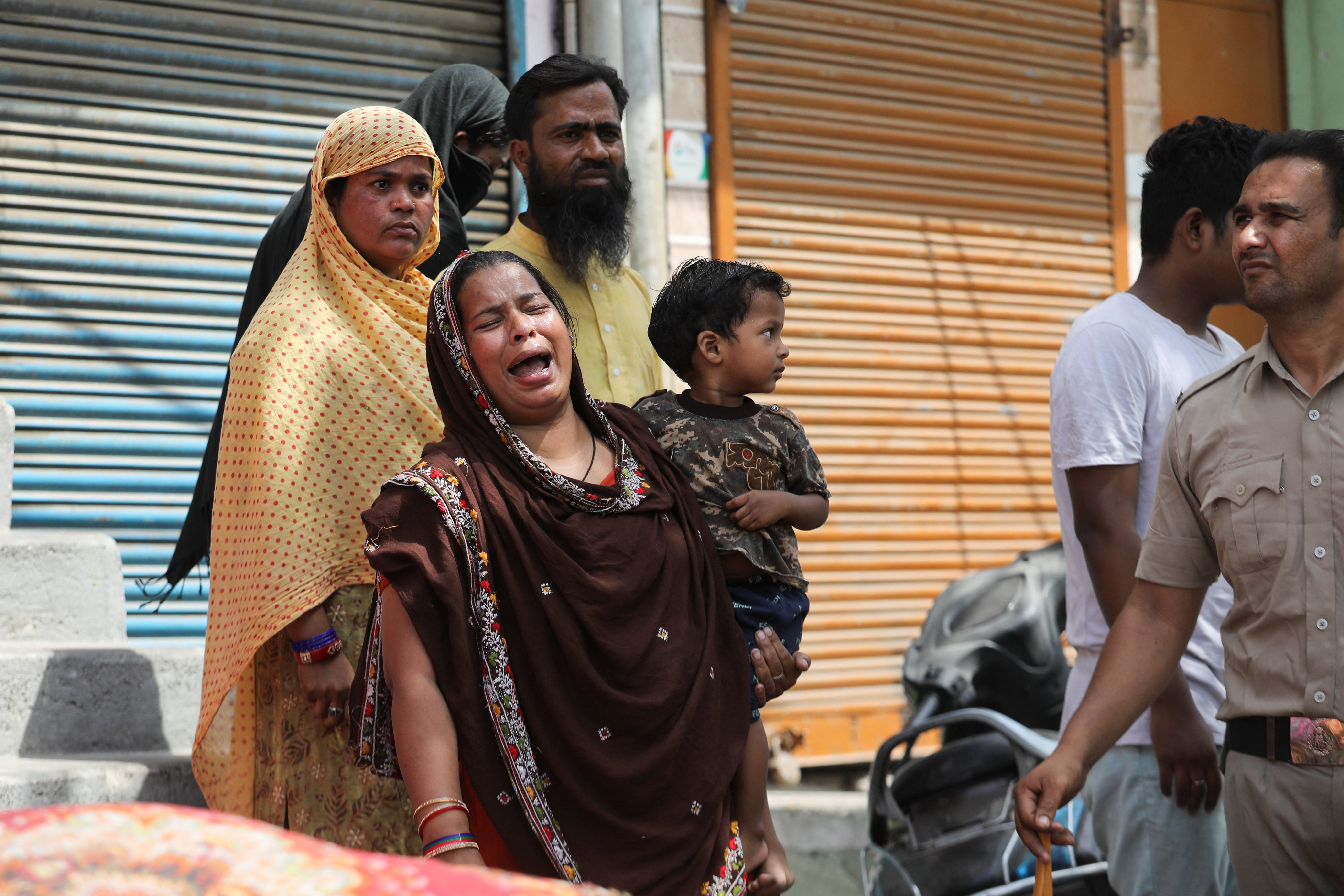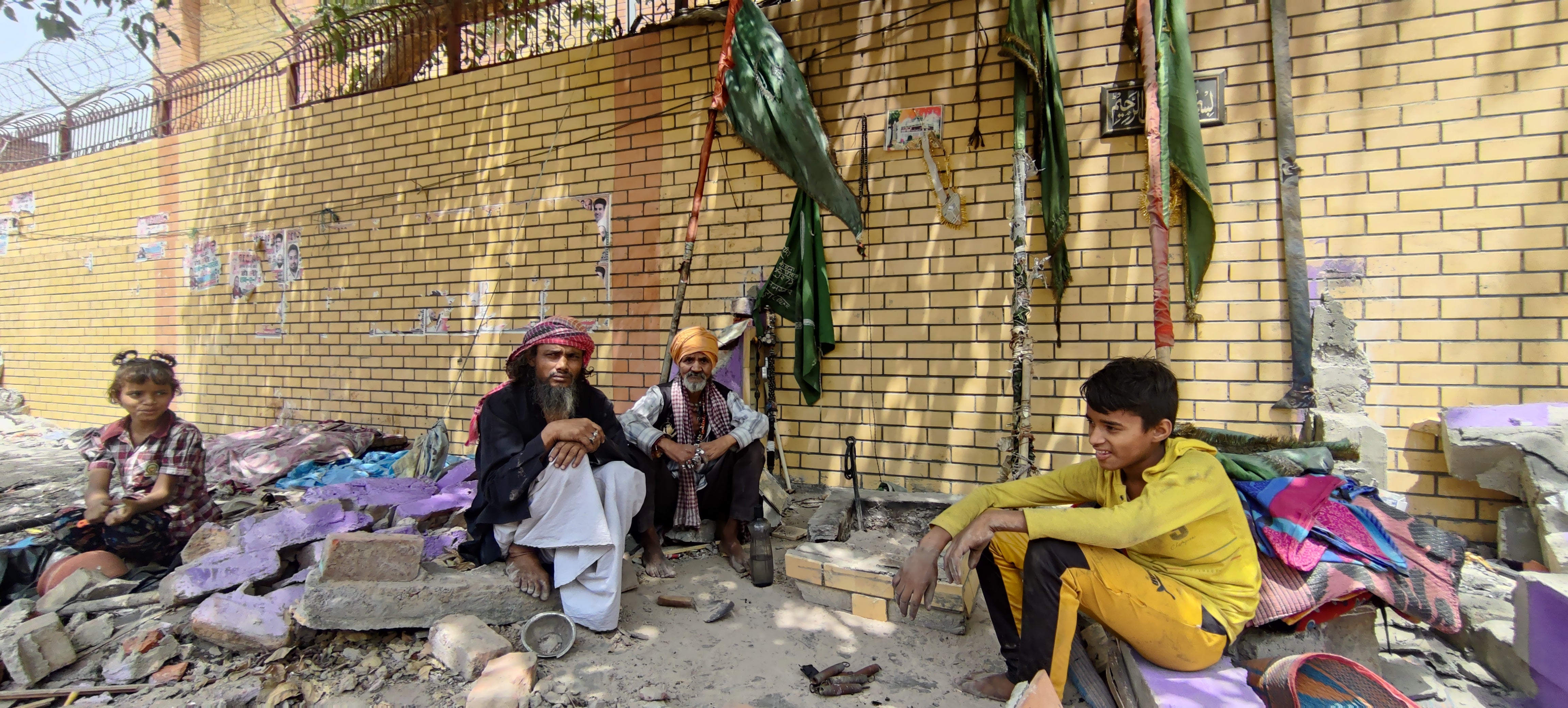‘Where is the justice?’: Despair after Delhi authorities bulldoze mosque, homes in response to religious riots
Days after clashes between Hindus and Muslims in north Delhi, bulldozers move in to destroy ‘encroaching’ homes and businesses — many of which are Muslim-owned. Shweta Sharma speaks to the distraught residents of this violence-hit neighbourhood

At least nine bulldozers rolled into the streets of Jahangirpuri in Delhi on Wednesday morning and pounded the entrance of a mosque, destroying the outer gate and staircase leading into it despite there being several people still inside.
The bulldozers, flanked by a heavy deployment of police and military forces, razed dozens of homes and commercial structures without giving prior notice to the owners, who begged authorities to give them some time to at least gather their belongings. These requests were ignored.
Residents in this crowded neighbourhood in the northern part of the capital say the destruction was ordered by local authorities to punish them after clashes between Hindus and Muslims in the area during a religious procession at the weekend, and that the majority of the destroyed properties belonged to Muslims.
The authorities say the structures had been built illegally and reject any link to Saturday’s communal violence, but the incident has polarised opinion online in India and there is particular outrage that the demolition drive continued for some time after an intervention by the Supreme Court.
When the bulldozers finally did stop it was outside a Hindu temple in the same block, just 50m from the mosque.
“Where is the justice?” asked Sayeda Biwi, the owner of a partially-demolished shop two doors from the temple. “They have broken the mosque but did not even touch the temple.
“If there was any justice in this country then they would have flattened all the structures and not singled out one community,” the busy shopkeeper told The Independent as she handed out water bottles and beverages to policemen during the scorching heat of Delhi’s late spring.
These policemen, she said, abused her, detained her husband briefly when he questioned the alleged bias, and oversaw the demolition of the face of her shop.
“We were trying to save each penny for Eid, but this is the government’s Eid present to us,” she said.

Nearby, a huge billboard lay on the ground with “Mera Bharat Mahan” (Hindi for “My India is Great”) sprawled over it alongside an image of India’s peace icon Mahatma Gandhi. The billboard was brought down when a JCB bulldozer destroyed a shop on which it was mounted.
The demolition drive was ordered late on Tuesday night by the North Delhi Municipal Corporation (NDMC), run by Narendra Modi’s ruling Hindu nationalist Bharatiya Janata Party (BJP), saying there would be a two-day anti-”encroachment” drive in C block of Jahangirpuri.
NDMC mayor Raja Iqbal Singh’s order to raze “illegal buildings that have encroached on to the roads” came just three days after communal violence broke out in the area during a procession to mark the birth anniversary of the Hindu god Hanuman, known as Hanuman Jayanti.
Muslims in the area alleged that members of the religious procession attempted to wave saffron-coloured flags in front of a mosque. The colour saffron is associated with Hindu nationalist groups in India.
Videos and stills shared on social media appeared to show members of the procession brandishing swords and guns as they danced to Hindu religious songs. Hindus who took part in the event, meanwhile, said they were pelted with stones.
The clashes that followed on 16 April left eight police officers and at least one civilian injured, and were followed by the arrest of 24 suspects. It represents the worst incident of communal violence in the Indian capital since the deadly religious riots in early 2020.
Residents told The Independent that the demolition drive started early on Wednesday morning and continued until after noon despite a Supreme Court order, issued at around 11am, to maintain the “status quo” with regards to the allegedly encroaching properties. Lawyers fighting the demolition say it was brought forward from 2pm in anticipation that the court might try to stop it.

Even as the Supreme Court order was widely being reported in the media, the North Delhi mayor said the demolitions would not stop until they received a physical copy. “The work will continue as the order has not reached us,” Mr Singh said told NDTV news.
He also dismissed claims that the demolition was linked to the earlier violence, and attempted to evade the question of whether the appropriate notices were issued to residents before the destruction began. He said the local authority’s job was to clear encroachments, and denied any discrimination on religious grounds. “NDMC is a government office. For us everyone is the same,” he said.
Residents told The Independent that the mosque that was partially demolished on Wednesday was the same one outside which Hindus and Muslims clashed last week.
And the demolition also came a day after Delhi’s BJP president Adesh Gupta wrote a letter to Mr Singh, demanding identification and demolition of “illegal encroachments” specifically belonging to those arrested in relation to the Jahangirpuri violence on Saturday.
"I congratulate the corporation for taking quick action on it," he said in a tweet on Wednesday.
Anti-encroachment drives are rare in the capital, where the proliferation of illegal and informal structures is rampant but actions are unusual. Only 20 per cent of Delhi residents live in planned settlements while the remaining 80 per cent live in unauthorised, unplanned colonies and slums, according to data by the Centre for Policy Research.
The Muslims in this relatively poor neighbourhood of Jahangirpuri accused authorities of targetting and suppressing them while questioning the legality of the process, claiming that they were given no notice or warning before the demolition drive.
Rashida Bewa, a widow who has been living in the area for decades, demanded answers from the government on why they were being punished.
Her children peeked through the balcony of their now partially-demolished home as she wailed over her destroyed food cart in the rubble-strewn street below. The kebab cart, she said, was her only source of income to feed her four children.
“I will ask the government to do one thing: ask the policemen to line us up in a queue and shoot us all at once. We are ready to die if that makes them happy,” she told The Independent as tears rolled down her cheeks.

Stretching her arms wide, she said: “We are ready to take a bullet. Shoot us. But we are not ready to bear the atrocities upon us.
“We are trying to earn respectable, meager income that we are making here. We are not stealing from anyone, we are not begging on streets. What will I do now,” she asked, adding that she was not involved in last week’s communal violence.
Later in the day on Wednesday, the government’s bulldozers carried on — now with the task of cleaning up the rubble they had created. Residents sifted through what remained to look for any valuables that may have survived the destruction.
Away from the cries over lost businesses or homes, a Hindu and a Muslim ascetic sat shoulder to shoulder on a concrete dias amidst the rubble of what was till a few moments before a shrine for believers of both the religions.
The shrine by the side of the road had stood as a symbol of brotherhood between Hindus and Muslims, noted the Hindu clad in a saffron turban, identifying himself as a baba, a spiritual person.
“He is Muslim and I am a Hindu,” he said, pointing at his counterpart. “They ran over the bulldozer on this shrine which is both for Hindus and Muslims. They should not have done this.
“Is this government so useless that it cannot distinguish between innocent people and miscreants?” he asked. “This has been done to divide Hindus and Muslims, and the rift will only widen with this demonstration of hate.”

Opposition party member Brinda Karat, who was the only senior politician to reach the demolition site on Wednesday morning, said the drive was “illegal” and “unconstitutional”.
The 74-year-old, a former member of India’s upper house of parliament for the Communist Party of India (Marxist), was widely praised online after dramatic images emerged of her standing in front of the bulldozers and waving the court orders to stop the drive.
“They were motivated not to uphold the law but to uphold a very sectarian, communal agenda of the party in power, that is the BJP,” she said. “You are bulldozing and bullying not just a community. You are bulldozing the law. You are bulldozing the Supreme Court order.”
The actions are being compared to similar demolition drives by the Madhya Pradesh government, which is also led by the BJP. There, the state government openly linked the destruction of property to religious riots which broke out on 10 April, when Hindus celebrated the festival of Ram Navami. “If Muslims carry out such attacks, then they should not expect justice,” the state’s home minister told NDTV.
A Muslim neighbourhood in the Madhya Pradesh city of Khargone was placed under curfew for 11 days after members of both communities hurled stones at each other, resorted to arson and damaged houses and vehicles.
The state’s chief minister and BJP leader Shivraj Singh Chouhan said “rioters will not be spared” and police “action will not only be limited to arrests, the damages will be recovered from the private or public property of the rioters”.
Similar incidents of communal violence have been reported from other parts of India in the past few weeks, especially on Hindu festivals, in places including Bihar, Jharkhand, West Bengal, Karnataka and Gujarat.
This recent string of communal violence has left two persons dead in Gujarat and Madhya Pradesh and scores of others injured.
Join our commenting forum
Join thought-provoking conversations, follow other Independent readers and see their replies
Comments
Bookmark popover
Removed from bookmarks